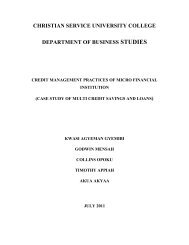TAX EVASION.pdf - Christian Service University College
TAX EVASION.pdf - Christian Service University College
TAX EVASION.pdf - Christian Service University College
You also want an ePaper? Increase the reach of your titles
YUMPU automatically turns print PDFs into web optimized ePapers that Google loves.
Tax evasion undermines developing countries efforts to raise resources, and developed countries’<br />
aid. Loss is around $500bn per year. Instead of being used to meet MDGs, the money goes to tax<br />
havens. This injustice must end. We must make this a major issue: it’s a comrnon agenda for<br />
developed and developing countries. Developed countries are losing a similar amount.<br />
Donors need to help developing countries establish transparent and efficient tax systems to (a)<br />
make tax evasion impossible and (b) to close loopholes to stop tax avoidance.<br />
Developing countries often lack the resources to keep up with complex international capital<br />
transactions. This links to the credit crisis - we have global movements of capital, but no real<br />
rules or regulations. The question is how can international agreements help developing country’s<br />
tax authorities and how can we use forums to strengthen best practices? This also creates a new<br />
relationship between governments and tax payers; helps to create responsible and accountable<br />
governance. Germany wishes to take action on tax evasion, and would like to discuss an<br />
international tax compact, and to develop new cooperation at national, regional and international<br />
levels. The credit crisis gives us new opportunities; now everyone is in favour of better<br />
regulation.<br />
2.19 Uganda Fights Tax Evasion<br />
The parliamentary committee on trade is currently considering a petition filed by Kampala City<br />
Traders Association against the increase of trade license fees.<br />
The association, through the Central Division MP, Erias Lukwago, petitioned Parliament<br />
against Kampala City Council’s (KCC) move to increase the fees. They are questioning the<br />
legality of the increment.<br />
City traders were paying between sh100,000 and sh200,000 annually for the licenses, but last<br />
year, city authorities increased the fees to between sh360,000 and sh950,000. KCC last reviewed<br />
the license fees 11 years ago. Appearing before the committee, trade Minister Major General<br />
Kahinda Otaflire, argued that the fees increase was realistic in view of the prevailing economic<br />
situation. He argued that people working or running businesses in the city should be prepared to<br />
pay taxes if they are to get services from the city authorities.



